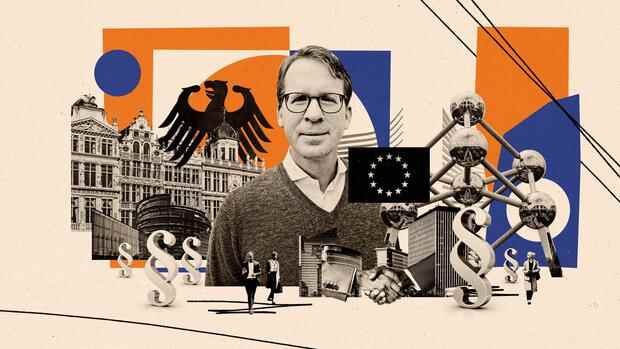Every week Moritz Koch, head of the Handelsblatt office in Brussels, analyzes trends and conflicts, regulatory projects and strategic concepts from the inner workings of the EU. Because anyone who is interested in business needs to know what’s going on in Brussels. You can reach him at [email protected].
Vladimir Vladimirovich Putin is known to Europeans as the President of the Russian Federation and Commander in Chief of the Russian Armed Forces. But in the past few weeks he has appeared in a new, unofficial role: as a kind of central banker for the European gas market.
By supplying the EU with natural gas, Putin influences energy prices in Europe, almost like central banks influence the interest rate, the price of money, by supplying and siphoning off liquidity.
According to EU data, gas is 400 percent more expensive today than in April. Of course, such price jumps cannot be explained monocausally. The pent-up demand after the pandemic, the consequences of an unusually cold winter – the Putin factor is one of many. But even a central bank does not determine the interest rate alone. The decisive factor is that Russia has opportunities to break the price spiral.
Putin could instruct the state-owned company Gazprom to replenish its stores in Europe. This would quickly put an end to the worry of bottlenecks. But the Kremlin chief has other plans.
Top jobs of the day
Find the best jobs now and
be notified by email.
Putin owes this power to one country in particular: the Federal Republic. With an ill-conceived energy policy, Germany has become increasingly dependent on Russia – and thus made Europe open to blackmail. Taking nuclear power plants off the grid faster than coal piles is negligent not only in terms of climate, but also in terms of foreign policy.
Because renewable energies cannot yet fill the electricity gap and the gas fields in the North Sea are drying up, Russia is becoming the supplier of last resort. The German government expects that the demand for Russian gas will increase in the next ten to 15 years due to the energy transition and only decrease again in the long term.
Nord Stream 2 is a heavy European mortgage
For the traffic light coalition, which is currently sorting itself out in Berlin, the German-Russian energy association is providing what is probably the heaviest European political mortgage that Angela Merkel leaves behind after 16 years as chancellor. Historical fears arise, especially in Eastern Europe, and there is enormous distrust of Berlin. Nord Stream 2 became the symbol of this.
The rumor is already circulating in Brussels that the Federal Network Agency will be waving the certification of the operating company of the new Ostseepipe‧line in the coming week, despite all the EU’s concerns. For Putin, this proves the strategic value of the pipeline even before the gas flows.
For weeks the Kremlin has been sending out a message that certification of the operating company would dampen the price of gas. A position that German Nord Stream 2 proponents adopt. Russia would already have opportunities to deliver more gas to Europe today – via the Ukraine’s existing pipeline network. But Moscow wants to seize the opportunity and cut off the neighboring country from gas transit.
There were enough warnings that Putin would use Nord Stream 2 as leverage. From Washington, from Brussels, from Warsaw and Paris. But in Berlin they have all been ignored. Above all, the Americans are accused of having an unfair motive of wanting to sell their own fracking gas. Instead of seriously considering whether it is strategically smart to entrust Germany’s energy security to the Kremlin.
More: The big winner of the gas price crisis is Russia

